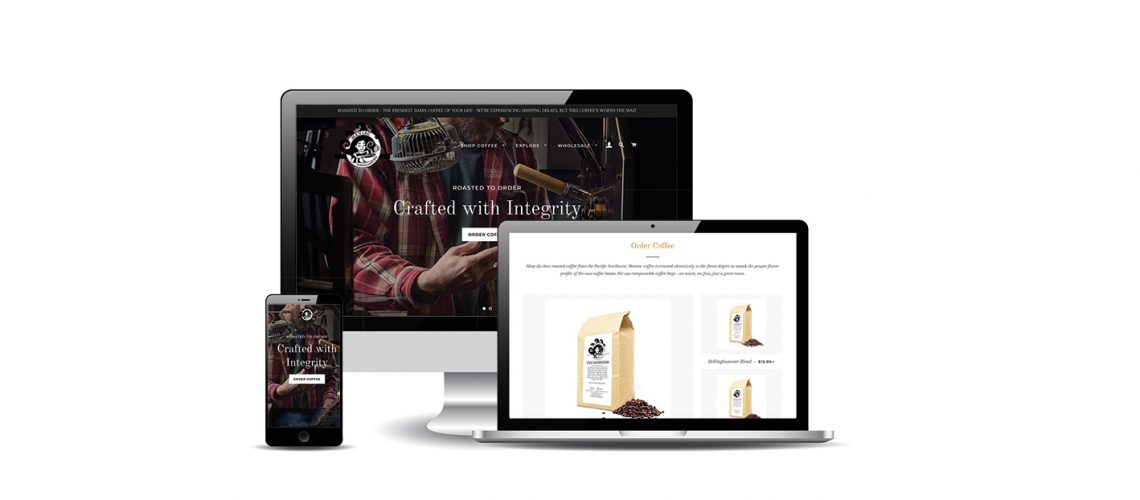Having a Well-Designed Website is About More Than Just Looks
There’s no longer any debate over the importance of having a website. Every modern business owner knows a web presence is absolutely essential to succeed in today’s marketplace. However, the place where some businesses are still missing the mark is in the assumption that the process ends there.
These days, there are plenty of free website builders available to us. Sites like Weebly and Wix allow those who consider themselves to be the least tech-savvy to do what several years ago would have felt like an impossible task. If you’re a business owner on a tight budget, it’s now completely possible to put together your own website in minimal time, with minimal investment.
But is that really the best idea?
Your website isn’t just an online business card, it’s your virtual storefront. It exists to get people in the door, and turn them into paying customers. Putting your website out to the public is more than just pressing that launch button. Just because it’s there doesn’t mean that it’s working.
When you put a website together, there’s a lot to consider. Your site is a representation of your brand. It needs to communicate who your company is, what makes you different, and why a customer should buy from you over a competitor.
What’s more, it needs to make sense. When a user logs on to your site, they need to be able to figure out immediately what the website is about and how to find the information they’re looking for. Within three seconds, your website needs to tell visitors what the site is about.
A number of things can ruin this experience for them, and if that happens, you’ll lose them within seconds. Consider these statistics:
- The majority of visitors will leave your site within 8 seconds
- About 96% of users that come to your site aren’t ready to buy
- As little as a one-second delay in your site’s loading time can lead to a 7% loss in conversion rates
- First impressions are 94% design-related
- 75% of users judge a company’s credibility based off of their web design (Stanford Web Credibility Research)
That right there should be enough to convince you that having a well-designed website is a big deal. Below, we’ll go over the individual reasons why good design is so important.
Yes, looks really do matter
We humans are heavily influenced by how things look. We’re known for choosing our preferences based largely on appearance, especially when we don’t have much more information to go off of. Think about it – how many times have you chosen a bottle of wine purely because of the label?
A beautiful website makes your brand look more professional, more trustworthy, and more modern. Have you ever gone to a website that looked outdated and wondered if the company is even still in business? How long did it take you to ditch that website?
Visitors will leave your site if it’s unpleasant to look at, if the text is difficult to read, or they don’t like your colors. If your site is confusing and it’s not instantly clear what you have to offer, you’ll lose potential customers.
The fact is, if your site looks weird to a viewer, it sends out a message that your company can’t be trusted.
Trust is everything

One of the biggest, most significant goals of every single website is (or should be) this: to establish trust. You may not realize it when you’re putting yourself out there for the world to see, but every piece of your website will make or break a potential customer’s trust in your brand.
According to surveys done by usability.gov, having a website that looks credible scored a four out of five on the “relative importance scale”. Things like grammatical errors, text that’s difficult to read, confusing navigation, inappropriate colors, and irrelevant images can all give the impression that your company can’t be trusted.
Your website also sets an impression of how your customer service will be. If you put minimal effort into your web design, it feels like you’ll put minimal effort into helping your customers. Make sure you give visitors easy ways to contact you, answer questions, and seek support.
Another way to demonstrate your trustworthiness is to include social proof. Social proof can take the form of testimonials, reviews, audience engagement, awards and certifications. When someone who isn’t already familiar with your brand sees other real people have had good experiences, they’re much more likely to trust you.
Site speed can make or break you
Designing a website without giving any thought to site speed is a grave mistake. It turns out that users care about site speed. Like, a LOT. In fact, 40% of visitors will abandon a website that takes more than three seconds to load. Three seconds! Those visitors might not ever come back to your site. Of shoppers who are disappointed with website performance, 79% of them say they probably wouldn’t buy from the company again.
Not only will a slow site upset your potential customers, but long loading times also impact your Google ranking. Sites that are slow are penalized by search engines. Slow-loading web pages also tend to increase bounce rates, another factor that will hurt your search engine rankings.
Things that can affect your site’s speed include large images, embedded videos, poor redirects, and code that isn’t optimized.
User experience is everything it’s cracked up to be

There’s a reason that the field of User Experience Design is one of the top growing career fields right now. Form (or beauty) is what makes design good; function (or usability) is what makes design great. Really great web design has smart, well-thought-out touches hidden in plain sight.
According to a survey put out by Hubspot, 76% of people say the most important piece of a website is that it’s easy for them to find what they want.
When you design a website, you need to make it incredibly easy for users to navigate. The site should immediately answer important questions they may have, like “how long will this product take to ship?” or “how do I order this?” or “what is the offer?”. You want to overcome any obstacles to a purchase.
Most visitors coming to your site are looking for product or service information, contact info, and your about page. This information should always be easy to find, from any point on your website.
Remember, if a user finds your website is difficult to navigate or confusing, they’re simply going to leave your site and take their business elsewhere.
Responsive design is mandatory
More than half of web users are now coming from mobile, so your website really needs to be responsive. Plus, 85% of adults believe that a company’s mobile experience should be as good (or better) than their desktop design. Visitors genuinely feel that when a company doesn’t create a good mobile site, they don’t care about their business.
Making a site responsive can be tricky to figure out, and is a huge reason to hire a web designer instead of trying to do it yourself. Also, the free web builder platforms don’t always provide a great mobile experience.
Good design is built to convert

A well-designed website is a converting machine. Web designers know this. There are principles of psychology and marketing that come together to optimize a site to make it more conducive to selling. Your homepage gets the bulk of your site traffic, so it needs to be set up to convert those visitors into leads and customers.
Companies are twice as likely to see a significant increase in sales when they build their website with conversions in mind.
Here’s a mistake a lot of struggling entrepreneurs make: they shovel out money for paid ads that bring people to their website that isn’t set up properly. This is why it’s so important to have a stunning, easy-to-use website from the beginning. Your other marketing efforts are worthless if they’re driving potential customers to a site that doesn’t function properly, scares users away, or isn’t set up for conversions.
The truth behind the techy tidbits
Here’s the cold, hard truth. We’ve established that it’s entirely possible to build a website with no tech knowledge whatsoever. The thing is, it still really, really helps if you do know a few things, though.
Us tech nerds, we’ve studied this stuff. We understand the data. We know how to run tests. We can fix your bugs. We do the maintenance you don’t wanna do. We know how to optimize. We know what metadata means. We pay for the software and the programs and the special tools.
Tasks like getting your site indexed by search engines, optimizing images, installing the right plugins, keeping your site secure, solving issues, adding alt tags, understanding accessibility, and working SEO in your favor are second-nature to us.
So, do you want to hire a web designer or do it yourself?
Look at it this way. If you own a brick and mortar business, you pay a hefty rental fee every month. You’re paying for the real estate, for access to foot traffic that gets people coming into your store and potentially becoming customers.
With your website, you’re also paying for real estate – your domain is like a virtual address that holds your business in place and gives visitors access to your products, from anywhere in the world. You could put up your own website with minimal time, effort, and money put in. However, would you ever open your brick and mortar with that same thought process?
It’s going to cost you an investment up-front, there’s no denying that. In the end, the payoff will outweigh that cost mightily. Your website lays the foundation for all other marketing you do. All of your efforts in content creation, social media, paid advertising, and public relations will point to your website. If you don’t have a well-designed website, all of that time and money is wasted.
Trust us. We’re experts.




